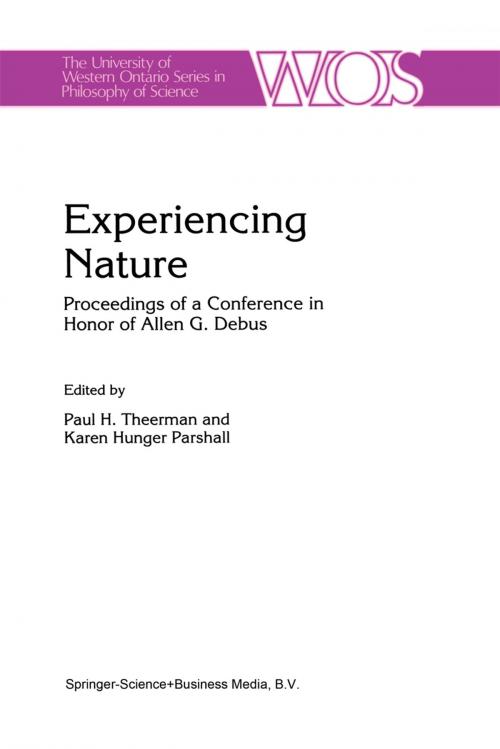Experiencing Nature
Proceedings of a Conference in Honor of Allen G. Debus
Nonfiction, Social & Cultural Studies, Social Science, Methodology, Science & Nature, Science, Other Sciences, Philosophy & Social Aspects, History| Author: | ISBN: | 9789401158107 | |
| Publisher: | Springer Netherlands | Publication: | March 11, 2013 |
| Imprint: | Springer | Language: | English |
| Author: | |
| ISBN: | 9789401158107 |
| Publisher: | Springer Netherlands |
| Publication: | March 11, 2013 |
| Imprint: | Springer |
| Language: | English |
This volume, honoring the renowned historian of science, Allen G Debus, explores ideas of science - `experiences of nature' - from within a historiographical tradition that Debus has done much to define. As his work shows, the sciences do not develop exclusively as a result of a progressive and inexorable logic of discovery. A wide variety of extra-scientific factors, deriving from changing intellectual contexts and differing social millieus, play crucial roles in the overall development of scientific thought. These essays represent case studies in a broad range of scientific settings - from sixteenth-century astronomy and medicine, through nineteenth-century biology and mathematics, to the social sciences in the twentieth-century - that show the impact of both social settings and the cross-fertilization of ideas on the formation of science. Aimed at a general audience interested in the history of science, this book closes with Debus's personal perspective on the development of the field.
Audience: This book will appeal especially to historians of science, of chemistry, and of medicine.
This volume, honoring the renowned historian of science, Allen G Debus, explores ideas of science - `experiences of nature' - from within a historiographical tradition that Debus has done much to define. As his work shows, the sciences do not develop exclusively as a result of a progressive and inexorable logic of discovery. A wide variety of extra-scientific factors, deriving from changing intellectual contexts and differing social millieus, play crucial roles in the overall development of scientific thought. These essays represent case studies in a broad range of scientific settings - from sixteenth-century astronomy and medicine, through nineteenth-century biology and mathematics, to the social sciences in the twentieth-century - that show the impact of both social settings and the cross-fertilization of ideas on the formation of science. Aimed at a general audience interested in the history of science, this book closes with Debus's personal perspective on the development of the field.
Audience: This book will appeal especially to historians of science, of chemistry, and of medicine.















